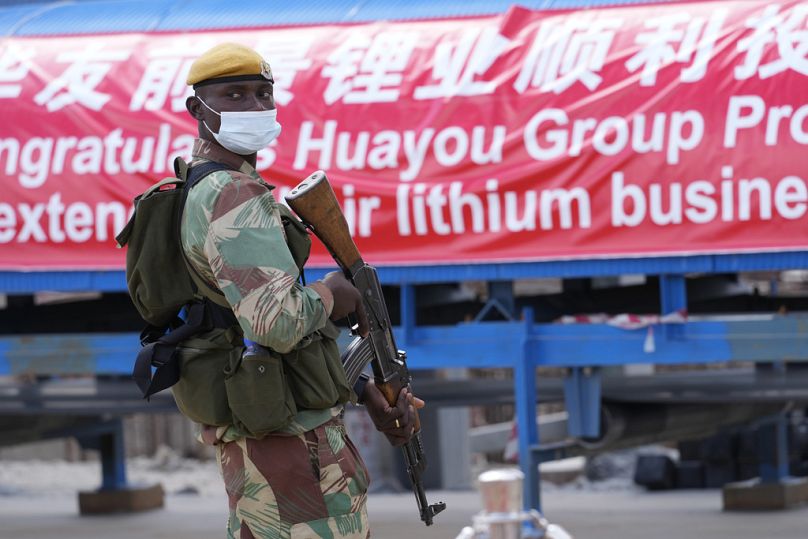Europe is rich in its own metals, but mining has a dirty image across the continent. Sustainable mining has to be our future, Jordi Bruno writes.
In order to move to using 100% renewable energy, the world will need as much copper over the next two decades as we have taken from the Earth since the beginning of civilization.
If that figure seems staggering, it is because the task of the green energy transition is a daunting task in itself.
Copper wiring, for instance, will be needed for nearly every component of this shift, from the devices and cars powered by green energy sources to the renewable plants and solar panels themselves.
Silver is needed for super-conductive wiring in wind turbines, and vast amounts of nickel and lithium will also be necessary to build the batteries to store electricity from renewable sources.
Add to that the aluminium and iron that are key to building green energy infrastructure.
Fortunately, these common metals are widely distributed and found in most countries, including most of Europe.
Less fortunately, Europe has so far been extremely reluctant to mine these materials.
Europe has to become resource-independent
Last week we saw the announcement of an Anglo-French joint venture to mine lithium in the southwest of England, with the goal of meeting around two-thirds of the UK's estimated battery demand.
However, there still is very low acceptance in Europe of the mining industry.
For many, mining is viewed as a developing world activity, one which is disruptive and polluting and is best done in Africa or South America. We currently import most of our metals.
However, if Europe does not become a mining continent, it will become dependent on countries like China for resources, particularly when it comes to lithium.
It is possible to import lithium from more politically friendly countries such as Argentina, Chile, and Mali. But being dependent on international supply chains for crucial resources is untenable.
A period of enormous change is happening
We do not need to import metals from the developing world, even lithium. There are major lithium resources in the Czech Republic, Serbia, Bosnia, and Spain.
Nickel exists plentifully in Europe. There are several large iron mines in Scandinavia, and copper is intensively mined in Spain and Portugal.
The Vareš silver mine in Bosnia is due to start production this year. But all European countries need to be promoting the extraction of these resources if they are to have a chance of achieving net zero.
Yes, this means mining, but it doesn’t have to mean mining in the way that Europeans and residents of other continents have historically experienced it; the slag piles and the "pits" of the increasingly obsolete coal mines.
The mining industry has been going through a period of enormous change and shifting towards something called "non-disruptive mining".
Non-disruptive mining exists — and there's proof it can be done easily
Non-disruptive mining means mines that run on renewable energy and whose transport logistics and water use is green.
It means restoring the nature that is disturbed by mining in a way that preserves and enhances local biodiversity and being careful about all the social and environmental impacts of a mine.
Most importantly, it means that the waste products which used to end up in slag piles — called "tailings" in the industry — are properly processed to recover all of the plentiful amounts of ore which they contain.
Sweden is Europe’s pioneer in non-disruptive mining. Its carbon-free iron mine in Kiruna is a sustainable mining flagship for the world, and the Grängesberg iron mine in central Sweden is also a notable sustainable mine.
Several of the companies that are expected to mine lithium in the UK have already committed to using a range of sustainable mining techniques ranging from running a plant on hydrogen or lithium-ion power, transporting ore via electric conveyors rather than trucks, and souring electricity from an off-shore wind farm to be built nearby.
Mining can be the bedrock of Europe's green energy transition
All of Europe needs to follow Sweden and the UK’s example and build greener mines, particularly copper, nickel and lithium ones.
In addition to these national projects, Europe as a whole should be investing in research into and proactive exploration of the major metal deposits in Europe and putting together large-scale green mining projects.
To achieve this, the image of the mining industry needs to change. Mining needs to become seen for what it is, the bedrock of Europe’s green energy transition and energy independence.
Jordi Bruno is the head of mining at the environmental and engineering business, the RSK Group.
At Euronews, we believe all views matter. Contact us at view@euronews.com to send pitches or submissions and be part of the conversation.














